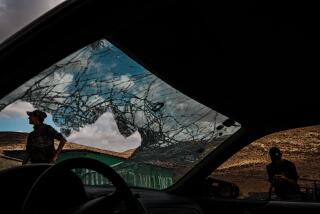Surreal Scenes on Streets of Zakhu : Iraq: Americans on a mission to shelter refugees find city of pool sharks, glowering Iraqis, Kool-Aid vendors.
ZAKHU, Iraq — One of the sharpshooters at the pool hall on Main Street is a leftie who makes the cue ball dance. He came to play in the heat and flies Wednesday in a bright green T-shirt that bore the legend: “Chico Mendes and His Killers. Chronicle of a Death Foretold.”
The sharpshooter knows no English, not much about Brazilian music and nothing at all about Gabriel Garcia Marquez, whose chronicle of magical surrealism he advertised with flick shots across the table where the felt was just a memory.
Of surrealism itself, however, the sharpshooter is an expert: He lives in Zakhu, the town in between.
Street scene, Zakhu, Iraq, 4 p.m., dusty under a baking sun:
Uniformed Iraqis with automatic weapons glowering at U.S. Marines dressed for war, who stare at other Iraqis, carrying worry beads, not guns, and holding hands in front of the cameras of a sweaty international press corps, trying to make some sense of it all.
“The soldiers rattle their guns at us, make nasty remarks,” said U.S. Marine Scott Whitney of Boston, who labored for two days to get the municipal water purification system working here. “It’s touchy. Something as silly as an insult could turn this place into a fire pit.”
Zakhu, a low, flat and undistinguished farm town of 50,000, has staggered in a few short weeks from jubilation to chaos, and now to fearful uncertainty amid astonishing spectacle.
It is a mostly Kurdish town which rebelled with the rest of northern Iraq against Saddam Hussein in March. For two weeks the flag of an independent Kurdistan flew over Zakhu. Hussein supporters fled, some died. Then the rebellion collapsed under a counterattack by the Iraqi army. There were summary executions on Zakhu streets.
More than half the population, including most of the local notables, joined a panic flight of more than 2 million Kurds who streamed toward Turkey and Iran from northern Iraq.
Last weekend, the U.S. Marines came to Zakhu, the only major town in a 600-square-mile haven in which the United States and its allies plan to shelter and protect the refugees when they return.
When the Americans arrived, Iraqi army units in the town left, but almost simultaneously, around 300 intimidating Iraqi police officers moved in. Townsfolk say they are not police at all, but secret police and army intelligence agents dressed as normal police.
“We’re watching them, and they’re watching us. A strange place, but everybody’s been nice to me so far,” said Air Force Staff Sgt. Kevin Goss of Knoxville, Tenn., one of a party of U.S. military photographers who toured the town Wednesday.
At midafternoon, the police watched as Marine armored personnel carriers drove through town, jet fighters patrolled overhead and heavily armed, no-nonsense British marines moved in. Their officers said they would begin patrolling the town and that the police would be invited to leave--by force, if necessary.
Until they do go, there is little chance the refugees who loathe and fear Saddam Hussein can be coaxed in large numbers to abandon their wretched mountain camps to return to their homes in Iraq.
And until the police go, the bizarre will rule Zakhu.
A smiling Iraqi police captain in a crisp green uniform invited a group of reporters to a cup of sweet tea in an alley off the main street Wednesday. But he fled in consternation on the arrival of a woman photographer from Austria in tight jeans and T-shirt.
A few produce and housewares shops opened Wednesday but did little business. Everybody was too busy watching the streets. One 10-year-old entrepreneur inaugurated what is bound to become a booming black market with the offer of a single American field ration, an MRE--Meal, Ready to Eat--of that old GI standby, chicken a la king.
At Faud’s barbershop on Main Street, one American correspondent was dragooned into a haircut and a beard trim. The shop boasted a big portrait of Saddam Hussein in a blue jumpsuit--Faud and his friends made sneering faces at it--plus what might pass as Kurdish soft porn: a model wearing a chunky, one-piece bathing suit from the Esther Williams era, although even less revealing.
There was barbershop wisdom as well--but no names, please; Saddam is watching. “Saddam bad. Bush good. Police no good. Police Ali Baba; they steal all,” said one man, who knew more English than his visitors knew Arabic.
One vendor of what looked like cherry Kool-Aid said that, like many residents who did not join the flight, he was a Christian. Around the corner from his stand was a securely locked Armenian Orthodox Church. The Christian pressed glasses of his sweet drink on passing Americans. An awkward moment. They were too polite to refuse and too scared to drink the stuff in a town without good water.
In one downtown square, photographers zeroed in on Iraqi passengers boarding two snorting buses as a gaggle of high school girls came by.
One backgammon player with lucky dice pronounced himself Zakhu’s best cabdriver. He seemed willing enough when passengers appeared, but didn’t take them where they wanted to go.
“No petrol,” he sighed.
It was that sort of day for Zakhu in limbo.
More to Read
Sign up for Essential California
The most important California stories and recommendations in your inbox every morning.
You may occasionally receive promotional content from the Los Angeles Times.










